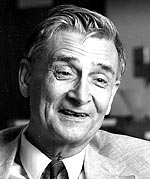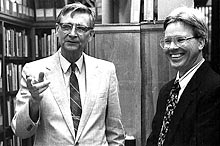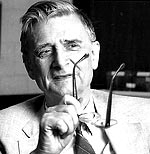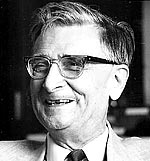Interview: Edward O. Wilson

By learning about tiny animals, Edward O. Wilson has become one of the giants of twentieth-century science. Many biologists are specialists who choose experimental organisms to fit questions in a particular research field. Edward Wilson's style is different: He has followed a group of organisms, the ants, into many fields of biology by studying their diversity, behavior, evolution, and ecology. Dr. Wilson has also helped synthesize entirely new disciplines, including sociobiology, which seeks evolutionary explanations for the social behavior of animals. Perhaps Dr. Wilson's greatest contribution is his influence in restoring the study of whole organisms to the center of biology. In the past few years, he has built on that influence to become a leading activist for the conservation of biological diversity.
Dr. Wilson has received most of the major national and international scientific prizes, including the National Medal of Science, the International Prize for Biology, the Eminent Ecologist Award, and the Crafoord Prize, generally considered the equivalent of the Nobel Prize for ecologists and evolutionary biologists. Wilson's students at Harvard have honored him with both of the outstanding teacher awards available, and he was recently named University Professor, one of only 15 on the Harvard faculty. Professor Wilson has also shared his view of life with general audiences in several books, two of which won the Pulitzer Prize. In one of his most recent books, the autobiographical Naturalist (Island Press, 1994), Dr. Wilson explains his lifelong interest in ants: "Most children have a bug period, and I never grew out of mine." That was evident when I met Professor Wilson in his Harvard office, which is cohabited by thousands of leaf-cutter ants marching between plastic boxes over a bowed tree branch that functions as an arched bridge.
In Naturalist you write that images from your youth created a "gravitational force" that pulled your research career and still defines you as a scientist. What were some of those formative experiences?
I had the good fortune of growing up in the beautiful environment of the Gulf Coast states, which remained relatively unexplored in natural history when I was a boy. Many species of frogs, salamanders, and fishes (not to mention insects) were still unknown to science. At a very early age I felt the excitement of an explorer-naturalist. I was able to have that experience before I reached high school age, and I had my career set. It has consisted substantially of trying to repeat these early experiences through one cycle after another of research.
Once you embraced nature and became an explorer-naturalist, how did your interest become focused on insects?
When I was seven years old, I lost the sight in my right eye in an accident. I therefore grew up with vision in only one eye, but fortunately it was relatively acute, particularly for objects at a short distance. Since I was predestined to be a naturalist and biologist, my disability directed me toward insects, for which you do not need great distance vision, and I made the most of it.
Why did you specialize in ants?
I include ants among what I like to call the little things that run the Earth. They, and many other groups of abundant insects, are extremely important in maintaining the balance of nature in the land environment as predators, scavengers, feeders on vegetation, and soil workers. Worldwide, they are more important than earthworms in the role of soil workers. Ants are essential to our existence. We tend to overlook them because they are hard to see—the ant is only about one-millionth the size of the human being—but they are there in vast numbers. I have made an estimate, or educated guess I suppose, that at any given time there are somewhere between a million million and 10 million million (1012-1013) ants alive. Remarkably, that immense legion adds up to approximately the same total mass as humanity.
You established yourself early in your research career as an ant taxonomist. What is it that you find so satisfying about taxonomy, and why do you think taxonomy is still of such fundamental importance to biology?
I believe that the taxonomist, more than any other specialist, is able daily to look upon the face of creation, by which I mean the immense variety of life. The taxonomist doesn't just identify and classify, but serves as the steward of the group on which he works; whether it is deep-sea fishes or ants or orchids or any of hundreds of other groups. The taxonomist, as his expertise broadens and deepens, becomes interested in the marvelous intricacies of anatomy and physiology, and, in the case of animals, behavior. He is a leading authority on that group overall. This sense of mastering a part of the creation creates constant excitement, as do the vast unknown phenomena that await the taxonomist upon further investigation in the field and within the laboratory. As a taxonomist, I know that I will be able to make a discovery of some kind or another—a new species, a new idea about relationships, a new anatomical structure—almost every day. When I go out in the field, the flow of discoveries increases. You know, in most disciplines of science the research stays inside, most activities of biology included. The number of important discoveries per investigator per year is dropping off steadily. In most fields, teams and great expense are needed. In particle physics, the teams often consist of a hundred or more people working together. In molecular biology, commonly a half-dozen or more. To be able to work alone, or at most with a single collaborator, with a steady flow of discoveries—that is exceptionally rewarding!
From your work as an ant taxonomist, your interests extended to general evolutionary theory. What influence drove that trend in your research?
I always wanted to do more than just natural history. I think that there is in me a need to put order into whatever I encounter in life. Someone once remarked that among scientists as well as nonscientists, there appear to be two classes of people: those who upon discovering disorder wish to convert it into order, and those who discovering order wish to reduce it to disorder. There are successful scientists in both genres in evolutionary biology. I have a passion for creating order. But beyond that, I have the ambition to create new theoretical systems in evolutionary biology. Taxonomy and natural history provide a tremendous background of information for creating new theory.
 In Naturalist, you write that "unlike experimental biologists, evolutionary biologists well versed in natural history already have an abundance of answers from which to choose. What they need most are the right questions." Can you explain?
In Naturalist, you write that "unlike experimental biologists, evolutionary biologists well versed in natural history already have an abundance of answers from which to choose. What they need most are the right questions." Can you explain?
I believe that the best evolutionary biologists are naturalists. The physical scientists and molecular biologists like to work from questions towards solutions on a single track. These questions take them deeper and deeper through molecular levels. But a naturalist tries to learn all that he can about the group of organisms or about a particular ecosystem. All forms of information regarded by the naturalist have value.
I was a typical naturalist throughout my career. I compiled information of all kinds about ants, and I had access to information from others' work. Patterns began to emerge in which generalities could be drawn. Evolutionary biology is full of patterns, rules, and trends. What then becomes important is: "What do these patterns, rules, and trends reveal?" In order to extend this mode of investigation, the naturalist has to go to the answers already before him and ask the right questions about the evolutionary process, about the history of the world. This has been by far the most important procedure in the history of evolutionary biology. For example, it is the process that Darwin followed when he developed the theory of evolution by natural selection, which has dominated evolutionary biology since his time.
When you speak about patterns and rules and trends and evolution, that all sounds very mathematical, and yet you have held yourself up as an example of a scientist who has made it in spite of "math anxiety." What encouraging words do you have for science students who are not math wizards?
I think I can give some good advice to young, would-be biologists. Some mathematics is important in pursuing a career in evolutionary biology — at the very least, models entailing probability theory and statistics. I am not a gifted mathematician. I discovered this the hard way, through years of study and lack of notable success. My greatest success in quantitative theory came when I deliberately teamed up with first-class mathematicians who then found my knowledge in natural history equally valuable. That is a fine way to do evolutionary biology—a mathematician teaming with an evolutionary biologist.
Furthermore, in certain areas of evolutionary biology, mathematical ability of a high level is not necessary. I have a rule that I follow: for every level of mathematical ability the biologist possesses, there exists a field within biology still poorly enough worked so that that level of ability is sufficient to do first-class theoretical work. Therefore, the advice I give to young biologists is, do not in your career rush to where most of the scientists are already gathered. Look for the less popular subjects where you will have the greatest chance to innovate.
And we can find some of these opportunities in natural history and evolutionary biology?
Modern biology consists of two major fronts of advance. One of them addresses the physical and chemical basis of life's operation and the development of organisms. The other addresses the behavior and the living together of organisms, as studied in behavioral biology and ecology, increasingly with a new emphasis on biodiversity. These latter areas—behavioral biology and ecology, or evolutionary biology for short—are attaining new importance to society. They also present some of the most intriguing unsolved problems of science. The main route into these fields is by way of natural history.
Your work on the natural history of ants catalyzed your interest in animal behavior, especially social behavior. What led you to write Sociobiology, which synthesized a new field?
There is a common feeling that I had some grand vision of producing an overarching theory and worked toward it in my career, but that isn't true at all. I started with ants and natural history. I followed a rule of research strategy while working with ants that goes as follows: For every group of organisms there is a set of problems with solutions for which that group is ideally suited. So having become fascinated with ants, I became increasingly fascinated with social behavior. At the same time, I was also gaining an interest in population biology because I saw this was a broad road into advanced theory of evolution. I saw at this point that the way to synthesize what we knew about ants and other social insects was to treat colonies as populations and to apply all the techniques and ideas of population biology to the colony of insects. The result was a book about social insects in 1971. I pulled the study of sociobiology, as I now called it, from natural history and population biology.
After finishing the book, The Insect Society, I decided that this approach, which proved to be successful with insects, should also apply to vertebrate animals, including birds. So I set out to extend all that I had done to the vertebrates. I wrote the book Sociobiology, the New Synthesis primarily to cover the social insects and vertebrate animals. I then saw that I could not leave out the most familiar vertebrate animal, Homo sapiens. I didn't intend to stir up the hornet's nest of controversy that in fact the book did create. I included two chapters in Sociobiology on human beings primarily for completeness. I admit that as I wrote the chapters I realized that many of the ideas coming from evolutionary biology and the current study of animal societies would find relevance in the social clime. I expected the book would have an impact, but I didn't expect it would have as controversial a result in the social science community as it did.
And with the benefit of retrospect, why do you think Sociobiology did trigger such strong reactions, not only from some social scientists but also from some biologists?
Certain biologists had strong political convictions. You must remember that Sociobiology came out in the middle of the 1970s, a time when most scholars in the social sciences believed not only that heredity has no importance in human social behavior, but that it is dangerous to speak of it because it might imply that human destiny is fixed, and that there is nothing we can do about social ills. This was a primary reason for resistance both from social scientists, who had already settled on a sociocultural explanation, and from some biologists. Since the 1970s, the evidence for genetic influence, certainly not genetic determination in a rigid sense but strong genetic influence on human social behavior, has grown very substantially. It is now perhaps a mainstream of thinking.
 In writing about sociobiology, you once claimed that some day biology must serve as part of the foundation of the social sciences. Has that started to happen as you predicted?
In writing about sociobiology, you once claimed that some day biology must serve as part of the foundation of the social sciences. Has that started to happen as you predicted?
Yes, I believe that sociobiology has already had a profound influence in some social sciences. For example, it has spawned a whole new and quite successful field in psychology called evolutionary psychology, which deals with biological components of human behavior. It has had considerable influence in anthropology, especially in the developing field of comparative studies of nonhuman primate species in relation to human social organization. It has had some influence in economics in the consideration of human choice behavior. And in legal theory, sociobiology has begun to influence thinking about matters such as adoption rights.
Is this all part of a generally increasing awareness about the relationship of science to society?
Science is no longer just a fun thing, like landing on the moon or discovering a new species of bird. It is vital—and people know it. They see science as a major part of modern ethics and legislative action. They also see the environment as something that they have got to know about.
You helped attract attention to biodiversity. What does the term mean?
Biologists define biodiversity in the broadest sense as meaning all of the variety of life—from the different genes at the same chromosome position within populations, up through different species of organisms, on up to different aggregations of species in ecosystems. The emphasis in this definition is on levels of biological organization. It is very important to study each one in turn and to understand fully how they are related to each other: the genes, the species, and the ecosystems.
Given your lifelong interest in biological diversity, how do you account for the timing of your relatively recent emergence as a major activist for conserving biodiversity?
I was a bit slow in becoming an activist. I was aware of the dangers to biodiversity even during my student days in the late 1940s and early 1950s, especially when I began fieldwork in Cuba and other tropical countries where the destruction was well advanced. But I held off becoming an activist until finally in the late 1970s. More precise information on the rate of the deforestation was becoming available then. And I and others were able to use the model of island biogeography that Robert McArthur and I developed to make at least a crude estimate of the rate of species extinction caused by habitat destruction in the case of rain forests. That did it for me. I realized that I should not leave conservation advocacy to others. I and other scientists should become more involved. The issue was just too important.
In one of your books, The Diversity of Life, you articulate an environmental ethic. What is it, and how is it derived?
Let me give you the brief description of my own ethic, and that is to make every effort to save all species. This will not be possible in every case everywhere in the world. We are destined to lose a substantial fraction, 10% or more, of the world's biodiversity, no matter what we do. But we should never knowingly allow a species to go extinct if appropriate measures can save it. That, in essence, is the biodiversity ethic.
How many species are known, and what other estimates are there as to how many actually exist?
Roughly 1.5 million species of organisms have been described and given formal scientific names to date. Beyond that, biologists do not know with certainty to the nearest order of magnitude how many species actually exist. Most would agree that there are at least 10 million alive on Earth today, the largest numbers of which are insects and other arthropods and microorganisms like bacteria. But estimates have been made closer to 100 million, and I tend to be one of the radicals who believes that it probably approaches that number. One of the most fascinating problems of evolutionary biology, therefore, is exactly how many — or even approximately how many—kinds of organisms there are on Earth. The second great unsolved problem of evolutionary biology is: Why?
 Is a near-complete catalog of species a realistic goal?
Is a near-complete catalog of species a realistic goal?
It is widely believed among biologists that biodiversity is so great, and so little is known about it, that it is impossible to study at all. But the fact is that a total global survey could be conducted by as few as 25,000 systematists devoting a lifetime career to the subject. Even if we stored this information the old-fashioned way, in books on library shelves, by devoting each page in a book to one species, the complete cataloguing of 100 million species would still occupy only 6 kilometers of library shelving — about as much as is in a medium-sized public library.
You once said, "The key to taking measure of biodiversity lies in a downward adjustment of scale." Can you explain what you mean?
The smaller the organism, the less we know about it. Probably fewer than one-tenth of the species of insects on Earth have been given a scientific name. It is obvious that it is far easier to find and study a bird or a mammal than a tiny insect. The percentage of identified bacterial species is probably much smaller yet. There may be up to 5000 species of bacteria in a single gram of forest soil, almost all of which are unknown to science. Bacteria are in the world of the very small, so they are the greatest challenge of biodiversity study.
You have said that the study and cataloguing of biodiversity is a great responsibility. Why is it so important?
Only by creating a complete catalogue of biodiversity, with information on the traits and the geographic distribution of all the species, can we fully understand the function of ecosystems and locate the most endangered species.
You have also called biodiversity our most valuable but least appreciated resource. What is the value of biodiversity, and why is it worth conserving?
The value of biodiversity is immense to the extent of being immeasurable. In future years it will be the source of countless new pharmaceuticals, genes for disease resistance, petroleum substitutes, and other products vital to human survival. The great majority of species have not even been considered with reference to the many contributions they can make to science and economic wealth. One reason we should study and maintain biodiversity is the great benefit that it can provide. Once lost, the species and its library of genetic information, with potential importance to the ecosystem, is gone forever and cannot be retrieved.
How does the current extinction rate compare to historical rates?
Using data from the fossil records, I have estimated that species are becoming extinct today at a rate of 1000 to 10,000 times faster than was the case before humanity evolved.
We are doing more damage than asteroids!
We are. The human species is our own home-grown asteroid.
Some conservation organizations now embrace what you call a "new environmentalism." How are approaches to conservation biology changing, particularly in light of economic impact in developing countries?
I introduced the term "new environmentalism" to denote the movement that began in the late 1970s and early 1980s to combine conservation efforts with local economic development. Conservationists realize that it is quite possible to combine the preservation of natural environments with the use of those natural environments in ways that actually contribute to the economic growth of local regions. Therefore, a lot of the efforts of conservation organizations are now devoted to the twin goals of saving species and habitats as always, but also of devising ways to make that compatible with economic development.
You've written about a haunting dream you have. What happens in that dream?
Well, everyone has anxiety dreams, and mine takes a peculiar naturalist turn. I find myself in the dream on an island in the South Pacific. That's where some of my main research efforts were in the early part of my career. In the dream I realize that I have not gotten around to exploring the ends of the island, but my plane is due to leave later that day. The dream consists of looking for natural habitats; however, as I go searching in the dream, I can never find them. What looks like the edge of a forest turns into a hedgerow planted by people. When I wake up from that particular anxiety dream, I usually feel not only anxious but also guilty and disappointed. You can take that as a kind of metaphor of what the modern conservationists feel—that we never, never do enough.
If there is any encouraging word in the biodiversity crisis, it is biophilia, a term you coined. What does it mean?
Biophilia was the offspring of sociobiology. I realized in the early 1980s that there was growing evidence for a genetic predisposition for many kinds of human behavior. I and others believed that there was such a thing as a human preference for certain types of natural habitats and an inherent tendency to affiliate with other forms of life. Since then more evidence has accumulated, and the idea of biophilia has become a popular subject in science as well as in conservation circles. The reason the phenomenon is so important if it does exist (and I believe it exists) is that it will provide a powerful base for an environmental ethic. In my opinion, we need to value biodiversity for the contribution made to the satisfaction of human nature and not just for the physical welfare it provides us.
At the end of Naturalist, you distill your philosophy down to three truths. What are they?
Quite simply they are: that the human species is a product of biological evolution; that human beings arose in an arena of natural environments and biodiversity, and that therefore natural environments are a precious part of human heritage; and finally, that neither philosophy nor religion can ever make much sense unless they take the first two points into consideration.
©2005 Pearson Education, Inc., publishing as Benjamin Cummings